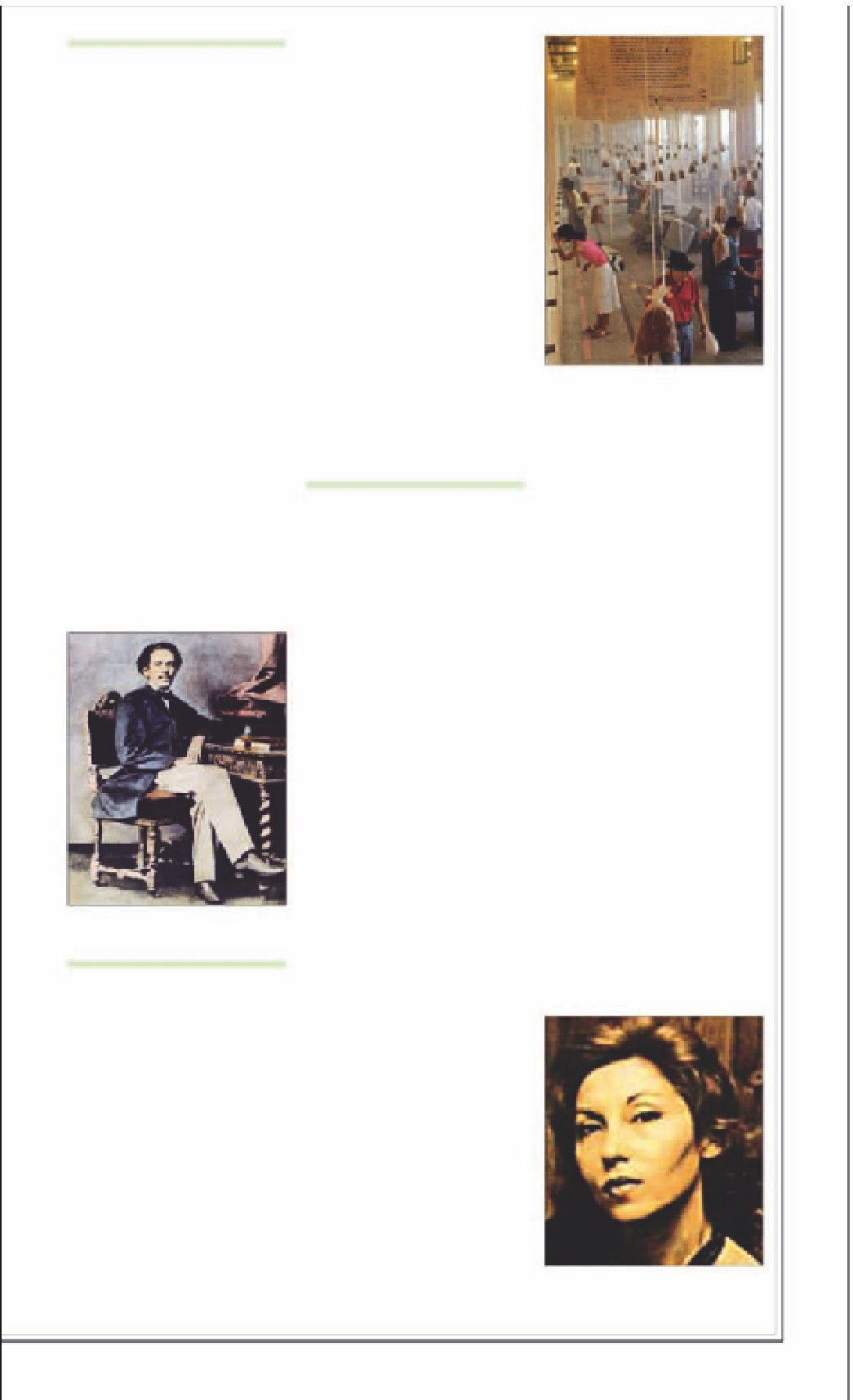Travel Reference
In-Depth Information
After independence in 1889,
Machado de Assis's social
criticisms were taken a step
further by a generation of
Republican novelists, influ-
enced by scientific and
nascent socialist ideas from
Europe. In
Triste fim de
Policarpo Quaresma
, the
black novelist, Afonso Lima
Barreto (1881-1922), was
openly critical of the
corruption that characterized
the Republic. Euclides da
Cunha's
Os Sertões
chron-
icled a gory and disastrous
military campaign against a
messianic rebel, Antônio
Conselheiro
(see p206),
and
his bandit followers in the
harsh landscape of the
Bahian
sertão
.
COLONIAL LITERATURE
European Jesuits are credited
with the earliest writing to
come out of Brazil. José
Anchieta (1534-97) chron-
icled his work and described
the evangelization of the
indigenous people. The
sermons of Antônio Vieira
(1608-97) are fine examples
of Portuguese prose.
Gregório de Matos (1623-
96), who was born in Bahia,
is sometimes cited as Brazil's
first celebrated homegrown
literary figure. During the
18th century, poetry acad-
emies in Minas Gerais were
producing writers such as
Cláudio Manuel da Costa
(1729-89), José Basílio da
Gama (1740-95), and Tomás
Antônio Gonzaga (1744-
1810). They introduced
revolutionary French ideas
to Brazil and wrote lyric
and epic poems on Brazilian
themes, but in a lofty
European classical style.
Grande Sertão exhibition, Museum
of Portuguese Language, São Paulo
Vinícius de Moraes (1913-
80), a seminal figure in the
contemporary Brazilian music
scene, was the first to plough
the furrow between music
and literature by writing the
lyrics of many famous songs.
He has since been followed
by songwriter Chico Buarque
(b.1944), who wrote the
novel
Budapest
.
Since 2000, writers from
Brazil's manifold ethnic
communities have risen to
prominence. In
Relato de um
Certo Oriente
, Milton
Hatoum (b.1952) probes the
psyche of an Arab immigrant,
while Moacyr Scliar (b.1937)
explores the Jewish-Brazilian
experience in his writings.
Today, Brazilian fiction
accounts for about half the
literary output of Latin
America. Writers include
Paulo Coelho (b.1947), fem-
inist novelist and short-story
writer Lygia Fagundes Telles
(b.1923), and Amazonian
poet Aníbal Beça (b.1946).
MODERNISM IN
LITERATURE
Modernism proper began in
Brazil with Mário and Oswald
de Andrade, who sought to
articulate contemporary and
uniquely Brazilian styles and
themes. Mário (1893-1945)
traveled throughout the coun-
try, searching for a unifying
traditional culture which he
enunciated in his comic rhap-
sody
Macunaíma
. Oswald
(1890-1953), together with
his wife Tarsila do Amaral,
formulated the ideas behind
the
antropofagismo
cultural
movement. The de Andrades
cleared the way for the
Modernist poets Carlos
Drummond (1902-87) and
Manuel Bandeira (1886-
1968), and the greatest of
all Brazilian writers, João
Guimarães Rosa (1908-67),
whose grand metaphysical
novel,
Grande Sertão:
Veredas
, invented a new
syntax based on the isolated
idioms of the interior of
Minas Gerais.
A string of writers,
including Gilberto Freyre
(1900-87), Sérgio Buarque
de Holanda (1902-82), and
Darcy Ribeiro (1922-97),
emerged from the social
sciences. The 20th century
also produced major popular
novelists, including Jorge
Amado (1902-2001) and
Clarice Lispector (1920-77).
Legendary mulatto writer, Joaquim
Maria Machado de Assis
THE EMPIRE & THE
REPUBLIC
Brazil began to find its own
voice in the last days of the
Empire with the great 19th-
century mulatto novelist,
Joaquim Maria Machado de
Assis (1839-1908). Starting
out with traditional senti-
mental romances, he later
became celebrated for his
darkly humorous novels with
their subversive social
criticism.
Dom Casmurro
is
considered by some to be
the greatest Latin American
novel of the 19th century.
Leading contemporary novelist,
Clarice Lispector


































